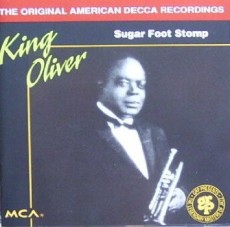
Daily Dose Of Jazz…
King Oliver was born Joseph Nathan Oliver on May 11, 1885 in Aben, Louisiana. He was also known as Joe Oliver and moved to New Orleans in his youth. He first studied the trombone and then changed to cornet. From 1908 to 1917 he played cornet in New Orleans brass and dance bands, and also in the city’s red-light district known as Storyville.
Oliver co-led a band with trombonist Kid Ory that was considered to be New Orleans’ hottest and best in the late 1910s. He gained great popularity in New Orleans across economic and racial lines, and was in demand for music jobs from rough working-class black dance halls to white society debutante parties.
With the closing of Storyville, Joe packed up his wife and child and moved to Chicago, Illinois in 1918. There he found work with clarinetist Lawrence Duhé, bassist Bill Johnson, trombonist Roy Palmer and drummer Paul Barbarin, eventually becoming the leader. By 1922 he was billing himself as King Oliver and his Creole Jazz Band at the Royal Gardens cabaret. His band included Louis Armstrong, Baby Dodds, Johnny Dodds, Lil Hardin, Honoré Dutrey and William Manuel Johnson. The following year they recorded for Gennett, Okeh, Paramount and Columbia record labels, bringing Dixieland to the attention of a much wider audience.
The mid-Twenties saw King enlarging his band to nine musicians, began performing more written arrangements with jazz solos, disbanding to do more freelance work in New York, Over the course of his career Oliver pioneered the use of mutes, including the rubber plumber’s plunger, derby hat, bottles and cups but his favorite mute was a small metal mute made by the C.G. Conn Instrument Company. He performed mostly on cornet, but like many cornet players he switched to trumpet in the late 1920s.
Oliver was also a talented composer, and wrote many tunes that are still regularly played, including Dippermouth Blues, Sweet Like This, Canal Street Blues, and Doctor Jazz. His recording Wa Wa Wa with the Dixie Syncopators can be credited with giving the name wah-wah to such techniques.
As an educator he influenced young New Orleans and Chicago players like Tommy Ladnier, Paul Mares, Muggsy Spanier, Johnny Wiggs Frank Guarente, Louis Panico and Louis Armstrong. The latter he taught, gave him his job in Kid Ory’s band and then summoned him to Chicago to play in his band.
As a businessman his acumen was often less than his musical ability losing jobs at the Savoy Ballroom and the Cotton Club by holding out for moe money than they were willing to pay. Ellington took the Cotton Club job and catapulted to fame
Oliver’s managers stole money from him and then the Great Depression hit losing his life savings to a failed Chicago bank, and bookings became lean.Oliver also had health problems, suffering from the gum disease pyorrhea, caused by his love of sugar sandwiches. He began employing younger musicians to play solos like up-and-coming trumpeter Henry “Red” Allen. Coupled with health problems suffering from periodontitis and his diminished capacity to play left him no choice but to stop playing by 1937.
Cornetist and bandleader King Oliver died in poverty of arteriosclerosis in a Savannah rooming house on April 10, 1938 at age 52, too broke to afford treatment. His sister spent her rent money to have his body brought to New York, where he was buried at Woodlawn Cemetery in the Bronx. In attendance were his friends Louis Armstrong, Clarence Williams, Coleman Hawkins, Lionel Hampton, W.C. Handy, Milt Jackson, and Max Roach. In 2007 he was inducted as a charter member of the Gennett Records Walk of Fame in Richmond, Indiana.
![]()


